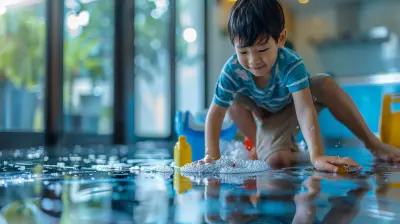25 April 2025
Parenting is no cakewalk, is it? Just when you think you've got this gig figured out, your once-tiny toddler becomes a tween, and then—blink!—a teenager. Suddenly, they’re rolling their eyes, insisting they know everything, and swearing they don’t need your help. But here's the thing: even older kids desperately need your watchful eyes. Yep, supervision doesn't stop just because they hit double digits.
We’re going to dive into why keeping tabs on them (without smothering them, of course) is so important—because you’re not just "hovering." You’re doing something invaluable for their growth, safety, and future. 
Why Supervision Isn’t Just for Toddlers
When we think of supervision, we often picture hovering over a curious two-year-old who’s one step away from sticking a crayon up their nose. But older kids? Many of us assume they don’t need us as much. They're more independent, aren't they?Well, yes and no. Older kids might not need you to buckle their seatbelt anymore, but they still need guidance in ways that aren’t always obvious. Think of it like flying a kite. You loosen the string as they soar, but you still hold on. Let go too soon, and they might crash before they're truly ready. 
The Myth of "They’re Old Enough"
How often have you heard people say, “Oh, they’re old enough to know better”? Let’s get real—being older doesn’t magically make kids immune to poor decisions. Their brains, specifically the prefrontal cortex (the part that handles judgment and impulse control), are still under construction well into their mid-20s. That means even your seemingly mature teen is prone to risky choices and emotional outbursts.Sure, they’ll argue they “get it” when you bring up curfews or screen time limits. But without the right boundaries and oversight, they’re navigating a world filled with challenges they might not yet fully grasp. Think about it—would you let a new driver hit the highway without any practice just because they turned 16? Absolutely not. 
The Digital Age: A World Full of Invisible Dangers
Let’s talk tech for a second. The internet is a fantastic tool, but it’s also a double-edged sword. Older kids spend an extraordinary amount of time on screens—texting, gaming, scrolling through endless TikToks, or chatting with friends on Snapchat. But how much do we, as parents, really know what’s going on?Behind those seemingly innocent apps can be cyberbullying, inappropriate content, or even predators. And let’s not forget the psychological toll of social media. The pressure to rack up likes, the fear of missing out (FOMO), and the endless comparisons can mess with their self-esteem big time.
Having watchful eyes doesn’t mean reading every text or becoming a digital dictator, but it does mean staying clued in. It’s about setting boundaries, having open conversations, and yes, occasionally peeking over their shoulder. Because let’s face it, the internet is like the Wild West—exciting but full of hidden traps. 
The Balance Between Freedom and Safety
I get it. You don’t want to be "that" parent who micromanages every move—they’ll resent you faster than you can say "grounded." But supervision doesn’t mean control. It’s like being the safety net under a tightrope walker. You let them walk the rope, but you’re there to catch them if they slip.Here’s the secret: let them have freedom, but make sure it’s within safe limits. Think of it as giving them bumpers at the bowling alley. Will they roll a perfect strike every time? Probably not. But those bumpers make sure they don’t end up in the gutter.
How to Supervise Without Smothering
So, how do you find that sweet spot? Here are some practical tips to keep an eye on your older kids without turning into Big Brother:1. Keep the Lines of Communication Open: Want them to trust you? Start by trusting them (within reason). Ask open-ended questions about their day. Instead of “Did you finish your homework?” try “How’d that math test go today?”
2. Set Clear Boundaries: Be upfront about rules. Whether it’s curfews, screen time, or friends coming over, make sure they know your expectations—and the consequences.
3. Lead by Example: Kids, even teens, are excellent copycats. If you want them to use tech responsibly or prioritize family time, then you’ve got to walk the talk.
4. Be Present (Even When They Pretend They Don’t Want You To Be): Show up for their soccer games, have dinner together, or just sit in the same room while they’re binging Netflix. Sometimes your mere presence speaks volumes.
Building Resilience Through Supervision
It might feel counterintuitive, but keeping watch doesn’t make your kids weak or dependent. It’s the exact opposite. When you supervise effectively, you’re teaching them how to navigate life’s challenges responsibly.Think about a hiker trekking through the woods. They’ll stumble here and there, but if someone’s walking beside them with a flashlight, they’re less likely to trip into a ditch. Your supervision is that flashlight. It gives them the confidence to take risks, knowing you’ve got their back.
Avoiding the Helicopter Trap
Wait, isn’t this starting to sound like helicopter parenting? Not exactly. Helicopter parents hover too closely, solving every problem before their kid even knows it exists. Supervision, on the other hand, is more about observation and guidance than intervention.Picture yourself as a lifeguard at the pool. You’re perched on the side, watching intently, ready to jump in if someone goes under—but you’re not paddling around beside them the whole time.
It’s all about giving them the tools to swim on their own while ensuring they’re not diving into the deep end unprepared.
Why Older Kids Still Crave (and Need) Structure
Believe it or not, structure makes kids—yes, even teens—feel safe. It’s like a GPS for life. Sure, they might roll their eyes when you enforce bedtime or limit their screen use, but deep down, those boundaries remind them you care.Without supervision, they’re left to figure out the world solo, and let’s face it—life is overwhelming enough as an adult, let alone as a kid trying to balance school, friends, extracurriculars, and a constantly buzzing smartphone.
When to Loosen the Reins
Of course, the goal of supervision isn’t to keep them under your watchful eye forever. It’s to help them develop the skills and judgment to fly solo someday. So, how do you know when it’s time to give them a little more rope?- They Show Responsibility: Are they keeping commitments, managing their time, and making good choices?
- They Own Up to Mistakes: If they can admit when they’ve messed up instead of hiding it, they’re on the right track.
- They Ask for Help When Needed: Independence doesn’t mean going it alone. If they’re reaching out when they’re in over their head, that’s a good sign they’re maturing.
Final Thoughts
At the end of the day, supervision is one of the greatest gifts you can give your older kids. It’s not about being overbearing—it’s about being present. Your watchful eyes remind them they’re not alone in this crazy, unpredictable world.So, when your kids insist they’re “too old” for your involvement, don’t feel guilty for staying involved anyway. You’re not just setting rules or enforcing curfews. You’re showing them love in one of its most powerful forms—keeping them safe while helping them grow.
Because let’s be honest: no matter how old our kids get, they’ll always be "our babies.




Zethryn McDowell
Great article! It’s so true that even older kids benefit from supervision. As they navigate new challenges and experiences, knowing they have a supportive presence can make all the difference. Your insights highlight the importance of balance between independence and guidance—thanks for shedding light on this vital aspect of parenting!
April 26, 2025 at 2:34 AM